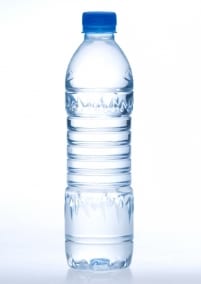Apparently not everyone is quite as critical of America’s obsession with water bottles. According to an article from the Canadian web site, BizEnergy.ca, (“Recycling and reusing plastic water bottles“), there is good news on the recycling front. Plastic water bottles are actually the third most recycled product in Canada after newspapers and aluminum. Just like in the United States, these recycled products are used to make everything from automobile parts to carpeting, shoes to playground equipment.
Recycled water bottles save energy
In addition to being able to make something new out of them, the whole process of recycling plastic is an energy saver in itself. When they are transformed into new products, recycling recoups up to 60 percent of the energy required to make that new product from virgin materials. An example of this was provided by ecoforce, stating that the energy saved by recycling just one plastic water bottle could power a 60W light bulb for six hours. Even glass water bottles can become energy savers when recycled, but unlike plastic bottles they can be reused without emitting toxic chemicals or wearing out.
Alternatives to plastic water bottles
While plastic bottles have their downsides, in many respects, they aren’t much worse for the environment than other products on the market. That said, vendors and consumers are slowly starting to form new habits. Many soft drink manufactures are switching to glass bottles because they are so much easier to clean and they retain their clarity without leaking chemicals. Restaurants are offering up tap water because they know an influential group of consumers prefer to patronize businesses that offer free, chemical-free water. Still others are out there with their own refillable water bottles, making a visible commitment to protect the environment.
If you are a vendor selling plastic water bottles, do your part to make sure you have adequate recycling facilities in or around your business. Without the proper receptacles, many of these water bottles may end up in a landfill.
What happens to your plastic water bottles?
If the bottles of water that you take to the gym, school or the office are properly disposed of, they may be lucky enough to live a very long and useful life. According to an article published by the Earth Institute at Columbia University, “What Happens to All That Plastic?” your water bottle is in for one heck of a ride: “Plastics that can be recycled are first sorted, shredded and rid of impurities like paper. The shreds are then melted and formed into pellets, which can be made into other products,” and these are often purchased by companies like AERT in Arkansas, or Virginia-based Trex, to make outdoor decking and fencing materials.
Plastic is derived from petroleum or natural gas in a chemical process that combines smaller molecules into a large chainlike molecule. Then it can be fused together with other substances to give the plastic particular qualities, but some of these chemicals can have adverse health effects. Plastic production is so important to the economy that it uses up about 8 percent of the world’s oil supply. As impressive as this may sound, it would be an ecological disaster without recycling. Because plastics represent such a large share of fossil fuel energy, leaving them in landfills is a huge waste of a natural resource that could have been used to produce heat, electricity or fuel.
The importance of proper disposal
In order to feel better about our rapid consumption of plastic water bottles, there must be a more conscious effort to recycle them. The failure to do this could result in a colossal waste of resources. According to National Geographic, the U.S. uses between 15 and 17 million barrels of oil each year just to meet manufacture, transport and dispose of plastic water bottles; enough to fuel more than 100,000 cars for an entire year. To put it another way, a Pacific Institute study suggests that producing bottled water, (when one accounts for all stages of manufacturing, transporting and chilling) takes approximately 2,000 times the energy required to produce tap water.
As responsible citizens of this planet, we must be certain that our empty water bottles find their way to a recycling facility. If we cannot do this we should find a more acceptable container.
Image Courtesy of John Kasawa / FreeDigitalPhotos.net



